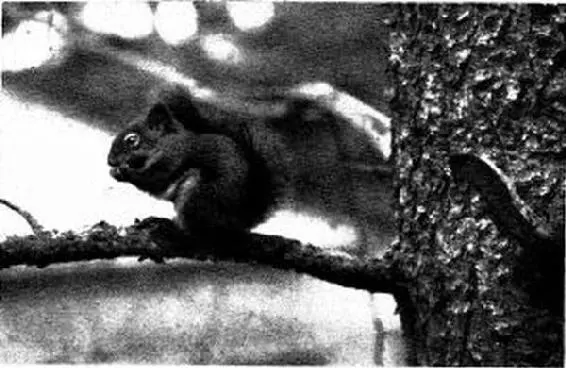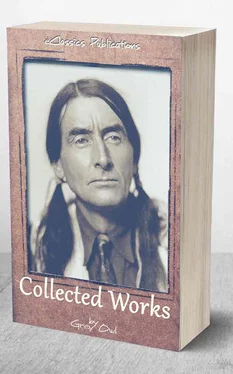Coupled with this cheerful reflection was the thought that perhaps, after all, my senses were deceived concerning the supposed position of that bluff of timber, and this spurred me on to renewed speed, if such a word could be applied to my groping progress. My arms became numb to the elbow, and my legs to the knee. My eyelids repeatedly stuck together with rime which I rubbed off with frozen mitts; and I stumbled on, knowing I must never fall.
The wind seemed to redouble its fury, and the wall of resistance that it opposed to my efforts seemed more and more a malicious attempt to detain me until I no longer had the strength to fight it. So that it became a personal issue between the tempest and myself; it with all the howling fury of unleashed omnipotent power, and I with all the hate, and bitterness and determination its buffeting had aroused in me.
How long this continued I do not know, but suffice it that in time I heard with certainty the roar of wind-tossed tree tops, and soon a black wall of forest rose up before me, and I knew that I now had a fighting chance. I quickly skirted a section of the belt of evergreens, looking up in an endeavour to find a bare pole protruding through the black tops, indicating a dry tree, but could distinguish nothing. Entering the grove I quickly chipped various trees, tasting the chips for dry wood; every one stuck to my lips, showing them to be green and impossible to start a fire with. A deadly fear entered my heart; supposing there was no dry wood, what then?
I commenced a frantic but methodical search, tapping boles with my axe for the ring of dry timber, but without avail.
Meanwhile the cold was biting deeper and deeper, and I was well aware that any wood found after the lapse of another twenty minutes would be useless, as I should by that time be unable to light a fire.
In a kind of a panic I ran out into the open, and, the storm having abated somewhat, I saw, to my unspeakable relief, a tall dry tamarac standing no great distance away, and hidden from me till then.
I attacked it furiously with my axe and now found that my wet mitts had frozen into such a shape that it was almost impossible to chop. I made several strokes, and the axe twisted in my grip and no more than dinged the tamarac, hardest of dry woods.
Once a glancing blow struck my foot, shearing through moccasin and blanket sock, drawing blood. Eventually the axe flew out of my numbed hands entirely and I lost precious seconds recovering it. There was only one alternative; I must chop barehanded. This I did, felling the tree, and continuing cutting it up until my fingers began to freeze. And then I found that my mitts, already too small, had so shrunken with the frost that now, hard as iron, I could not put them on again.
I stood for a moment, as the deadly import of this entered my brain with damning finality. I was confronted with the stark staring fact that I could no longer use my hands; and around my feet the snow was stained with an ever-widening patch of blood. I was as near to death as mortal man may be and yet live.
The storm had passed. The Northern Lights commenced their flickering dance. The landscape had now assumed an appearance of hypocritical solemnity; the moon also appeared, to lend the proper air of sanctimonious propriety fitting to the occasion, and the capering corpses in the northern hemisphere mocked with their grotesque gyrations my abortive movements.
I marvelled somewhat that in this present day and age of achievement, with civilization at its peak, I should be beyond its help, dying in a way, and owing to conditions long supposed to be out of date. I got a slight "kick" out of the notion, and thus exhilarated suddenly decided that this was no time and no place to die. I intended to be no spectacle for a gallery of ghouls, nor did I propose to submit dumbly to the decrees of one whom I had yet to meet—The Devil of the North forsooth, with all his power and his might!
I laughed aloud, for I had a trump card; two of them, in fact, one up each sleeve; he should not freeze my hands, and so destroy me. I decided that I would freeze my hands myself. And so I did, cutting up and splitting, until my hands became bereft of power and feeling, fully believing that I had lost my fingers to save my life.
I made a fire. The agony of it as the circulation made its way through the seared flesh; and the fear of a horrible death by blood-poisoning, or a useless existence without hands! For a man finds these things hard to accept with the calmness expected of him, and I am perhaps of softer mould than some.
Gibbering madmen have before now dragged their hideous deformities out to the haunts of man to exhibit them as payment exacted for lesser follies than I had committed that night. My fingers were frozen and my foot cut to the bone, but not badly enough to cause permanent injury, although I could hunt no more that winter.
I later found that the muskeg skirted the lake, and the next morning as I moved out I discovered that the clump of spruce that I had originally intended to pass by was an offshoot of the forest that I was looking for, and that I had spent the night, half-frozen, within a rifle-shot of my discarded clothes.
So I am still in doubt as to whether that blizzard was intended to destroy me, or if it was not merely one of those rough, but friendly attempts to set us on the right road, that we sometimes suffer at the hands of our friends.
CHAPTER SIX – THE FALL OF THE LEAF
"Now the Four-Way Lodge is open,
Now the Hunting Winds are loosed."
Much has been written concerning the beauties and the joys of spring. Poets have glorified that time of flowers, and budding leaves, and frisking lambs in every language. I have, however, formed the opinion, after observing a good many of them, that spring is a time of the year to be regarded as something to look back on, or forward to, but not to enjoy. In the snow countries it is a season of floods, wet feet, bad trails, transportation difficulties, and shortage of supplies.

Red Squirrel. Mischievous, curious, irascible, this little
creature is the lonely traveller's constant companion.
Easter is a favourite season for breaking ice, and carrying canoes on snowshoes over portages flooded with slush; whilst the weather is a nightmare of wet snowstorms and chill rains, or, if warm and clear the resultant thaw produces torrents of melted snow water and shaky ice. By the time these conditions mend equipment has been damaged far more than by the wear and tear of a whole year of honest travel. Men's patience is worn to a frazzle, and the seeds of a wasting sickness are often laid in the system of those who perforce must sleep out in the rain or not sleep at all.
Here, spring is a time of the year when the marriage market is weak, bootleggers' receipts are high, and those of the Church very low. I think the habitants have a saint whose speciality it is to care for travellers at this season. I should much like to meet him, and discuss the matter quietly as between gentlemen, without witnesses.
Rarely do we hear favourably, in poetry or in prose, of that season called by some the "death of the year," and too often looked forward to with misgiving as the precursor of dread Winter, the Fall. To those who may view its splendours in a forest untouched by the hand of man, autumn means much more than just the transition between the closing of summer and the coming of winter. In a country composed, as Canada is, largely of wild lands it means above all the opening of the hunting season, with the breaking of the monotony of civilized life, and all the freedom for the indulging of primitive instincts that goes with it.
Читать дальше













